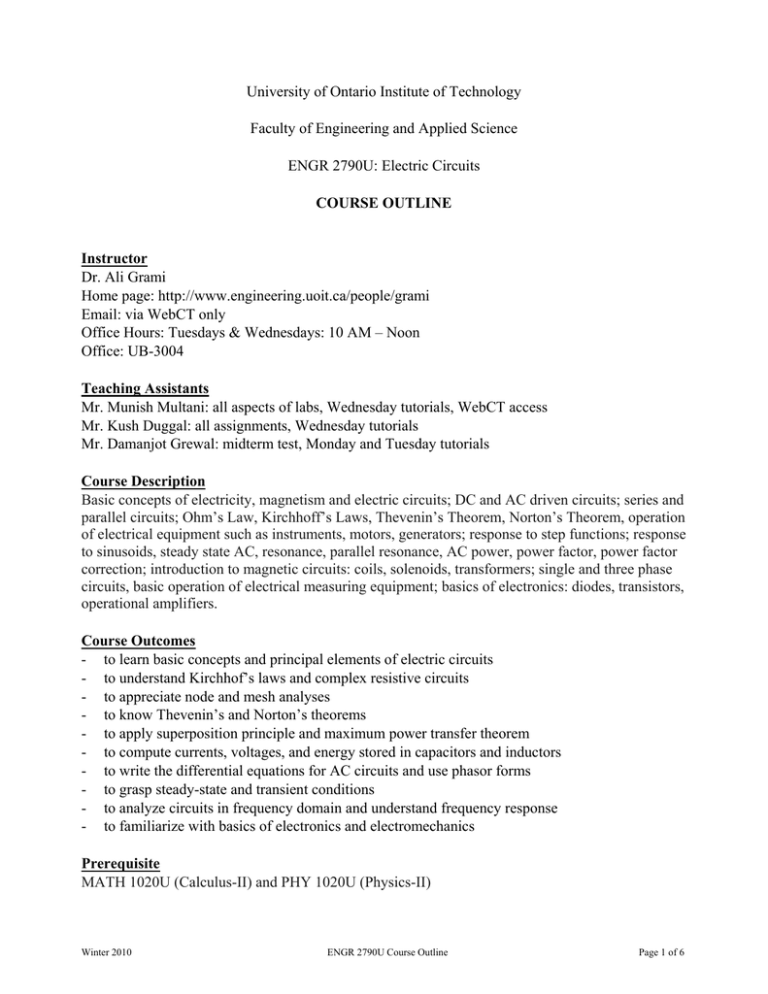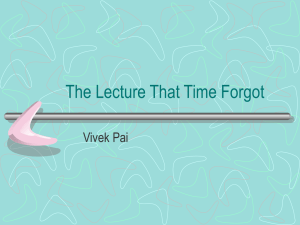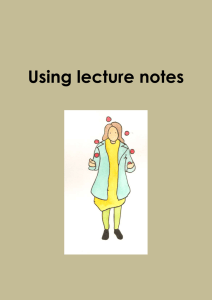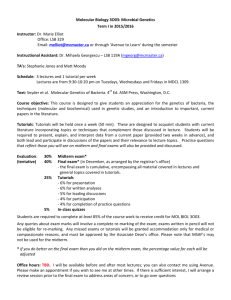ENGR 2790U W10 - UOIT.CA: Faculty Web Server
advertisement

University of Ontario Institute of Technology Faculty of Engineering and Applied Science ENGR 2790U: Electric Circuits COURSE OUTLINE Instructor Dr. Ali Grami Home page: http://www.engineering.uoit.ca/people/grami Email: via WebCT only Office Hours: Tuesdays & Wednesdays: 10 AM – Noon Office: UB-3004 Teaching Assistants Mr. Munish Multani: all aspects of labs, Wednesday tutorials, WebCT access Mr. Kush Duggal: all assignments, Wednesday tutorials Mr. Damanjot Grewal: midterm test, Monday and Tuesday tutorials Course Description Basic concepts of electricity, magnetism and electric circuits; DC and AC driven circuits; series and parallel circuits; Ohm’s Law, Kirchhoff’s Laws, Thevenin’s Theorem, Norton’s Theorem, operation of electrical equipment such as instruments, motors, generators; response to step functions; response to sinusoids, steady state AC, resonance, parallel resonance, AC power, power factor, power factor correction; introduction to magnetic circuits: coils, solenoids, transformers; single and three phase circuits, basic operation of electrical measuring equipment; basics of electronics: diodes, transistors, operational amplifiers. Course Outcomes - to learn basic concepts and principal elements of electric circuits - to understand Kirchhof’s laws and complex resistive circuits - to appreciate node and mesh analyses - to know Thevenin’s and Norton’s theorems - to apply superposition principle and maximum power transfer theorem - to compute currents, voltages, and energy stored in capacitors and inductors - to write the differential equations for AC circuits and use phasor forms - to grasp steady-state and transient conditions - to analyze circuits in frequency domain and understand frequency response - to familiarize with basics of electronics and electromechanics Prerequisite MATH 1020U (Calculus-II) and PHY 1020U (Physics-II) Winter 2010 ENGR 2790U Course Outline Page 1 of 6 Course Organization 3 lecture hours and 2 tutorial hours per week as well as 2 laboratory hours bi-weekly for one semester Textbook Giorgio Rizzoni, Principles and Applications of Electrical Engineering, 5th Ed., McGraw-Hill, 2007, ISBN: 9780073220338. Course Evaluation (Mark Distribution) Assignments: 15% Labs: 15% Midterm Test: 20% Final Exam: 50% Course Content Basics of Electric Circuits (~ 2 lectures) Fundamentals of Electric Circuits: Sections 2.1-2.8 (~ 3 lectures) Resistive Network Analysis: Sections 3.1-3.3 and 3.5-3.7 (~ 3 lectures) AC Network Analysis: Sections 4.1-4.5 (~ 3 lectures) Transient Analysis: Sections 5.1-5.5 (~ 3 lectures) Frequency Response and System Concepts: Sections 6.1-6.3 (~ 3 lectures) AC Power: Sections 7.1-7.6 (~ 3 lectures) Basics of Electronics: Sections 8.1-8.2 and 9.1-9.2 (~ 2 lectures) Basics of Electromechanics: Sections 18.1 and 18.4 (~ 2 lectures) Course Content Breakdown (Categories defined by the Canadian Engineering Accreditation Board’s (CEAB’s) Accreditation Criteria and Procedures report, available at http://ccpe.ca/e/files/report_ceab.pdf) Mathematics: ~ 0% Basic Science: ~ 0% Engineering Science: ~ 90% Engineering Design: ~ 10% Complementary Studies: ~ 0% Lectures - Section-1: Tuesdays: 2:00 – 3:30 PM in J127 and Fridays: 3:40 – 5:00 PM in J127 - Section-2: Tuesdays: 3:30 – 5:00 PM in UL9 and Thursdays: 2:00 – 3:30 PM in UL9 - It is highly recommended that all students attend all lectures and pay full attention at all times Tutorials - Slot-1: Wednesdays: 5 – 7 PM in UA-3130 Æ TA: Mr. Munish Multani - Slot-2: Mondays: 7 – 9 PM in UA-2230 Æ TA: Mr. Damanjot Grewal - Slot-3: Tuesdays: 5 – 7 PM in UA-3140 Æ TA: Mr. Damanjot Grewal - Slot-4: Wednesdays: 5 – 7 PM in UA-3140 Æ TA: Mr. Kush Duggal - Tutorial attendance is recommended; there are no tutorials in the weeks of Jan. 11th & Feb. 15th. Winter 2010 ENGR 2790U Course Outline Page 2 of 6 Important Dates • Tuesday January 26, 2010: Due date for Assignment-1 • Tuesday February 2, 2010: Due date for Assignment-2 • Friday February 5, 2010: Last day to withdraw without academic consequences • Tuesday February 9, 2010: Due date for Assignment-3 • February 15–19, 2010: Midterm break (no classes, tutorials, and labs during the week) • Tuesday February 23, 2010: Due date for Assignment-4 • Tuesday March 2, 2010: Due date for Assignment-5 • Tuesday March 9, 2010: Midterm Test • Tuesday March 16, 2010: Due date for Assignment-6 • Tuesday March 23, 2010: Due date for Assignment-7 • Wednesday March 24, 2010: Last day to withdraw from winter semester courses • Friday April 2, 2010: Good Friday (Holiday) • Tuesday April 6, 2010: Due date for Assignment-8 Academic Integrity and Conduct UOIT is committed to the fundamental values of preserving academic integrity as defined in UOIT policies and contained in the UOIT Undergraduate Calendar. Students should familiarize themselves with UOIT’s policies and statements in this area. Acts of academic dishonesty of any type and in any form, including plagiarism, cheating, aiding others in cheating, and examination impersonation, will be dealt with severely as they threaten the integrity of the academic system and are not acceptable. All students must know about academic misconduct as reflected in the following references: i) http://innovation.dc-uoit.ca/plagiarism_lo/index2.html, ii) Section 5.15 on Academic Conduct in the UOIT Academic Calendar, and iii) Academic Integrity Student Guide on WebCT. Accessibility To insure that disability-related concerns are properly addressed during this course, students with documented disabilities and who may require assistance to participate in this class are encouraged to speak with their instructor as soon as possible. Students who suspect they may have a disability that may effect their participation in this course are advised to go to the Centre for Students with Disabilities (room B297, Durham College) as soon as possible. Assignments (15%) - There are 8 equally-valued assignments. - Every student is expected to submit all 8 assignments: the best 5 out of 8 will be considered. - Assignments must be submitted in class on the due date, but prior to the lecture. - Late assignments will not be accepted (i.e., the student gets a zero on his/her assignment), unless the late submission proves to be legitimate (i.e., backed by strong bona fide evidence and approved by the instructor). - Print from WebCT the assignment sheet containing the assigned problems, read it carefully, write your name and student number on it, and staple it as the cover page. - Marked assignments will be returned during the Tuesday lectures, and your questions regarding marking, if any, must be directed to Mr. Kush Duggal (he can be contacted during Wednesday tutorials: 5 – 7 PM in UA-3140). Winter 2010 ENGR 2790U Course Outline Page 3 of 6 Labs (15%) - The TA in charge of all aspects of the lab is Mr. Munish Multani. - You must attend the lab in which you registered; you cannot attend another session. - Each group of two students (per station) will get a zipper bag consisting of a variety of resistors and capacitors for all 6 experiments, i.e., for the entire semester. You will get them in the first lab you go to. You are responsible for all components, do not lose them, nor do you destroy them. You have to bring them for every lab to set up your experiment. - The laboratory is located in UA-2540. - Lab attendance for all experiments and submission of all lab reports are compulsory, In case you miss a scheduled lab, a make-up lab (by contacting the TA to arrange one) is a must. - Utmost caution must be exercised at all times by all students working with the lab equipment. - There are six equally-valued lab experiments. - All info relevant to the lab (i.e., lab and safety manuals) are posted on WebCT, they must be read carefully and followed thoroughly before going to the lab, so you will have the pre-lab work ready and know what you are supposed to do in the lab, it may prove to be useful to have a print-out of the experiment sheets for each lab. - There should be two students in a group, one is involved in setting up the experiment and the other with the documentation (recording the data and writing the group report), and for every experiment, the two students in a group take turns in assuming these two roles. - The individual pre-lab is a must; it is submitted in the lab before doing the experiment. - The group lab report reflecting the lab experiment results is due one-week after the lab is done, it is marked by Mr. Munish Multani. You must follow his instructions regarding the lab reports. - There will be two students per group (experiment set-up); students could select their lab sessions and groups during their first lab. - The lab slots are as follows: Slot-1: Mondays 8 AM – 10 AM Slot-2: Mondays 11 AM – 1 PM Slot-3: Mondays 5 PM – 7 PM Slot-4: Thursdays 5 PM – 7 PM - The lab schedule is as follows: Week of Jan. 11th Æ No labs Week of Jan. 18th Æ Group-1 Æ Experiment-1: Lab Equipment Familiarity Week of Jan. 25th Æ Group-2 Æ Experiment-1: Lab Equipment Familiarity Week of Feb. 1st Æ Group-1 Æ Experiment-2: Voltage and Current Dividers Week of Feb. 8th Æ Group-2 Æ Experiment-2: Voltage and Current Dividers Week of Feb. 15th Æ No labs Week of Feb. 22nd Æ Group-1 Æ Experiment-3: KVL & KCL Equations Week of Mar. 1st Æ Group-2 Æ Experiment-3: KVL & KCL Equations Week of Mar. 8th Æ Group-1 Æ Experiment-4: Basic Network Theorems Week of Mar. 15th Æ Group-2 Æ Experiment-4: Basic Network Theorems Week of Mar. 22nd Æ Group-1 Æ Experiment-5: Superposition & Maximum Power Theorems Week of Mar. 29th Æ Group-2 Æ Experiment-5: Superposition & Maximum Power Theorems Week of April 5th Æ Group-1 Æ Experiment-6: AC Signals and RC Circuits Week of April 12th Æ Group-2 Æ Experiment-6: AC Signals and RC Circuits Winter 2010 ENGR 2790U Course Outline Page 4 of 6 Test (20%) - There is a 75-minute closed-book midterm test on Tuesday March 9, 2010, to be held in the classroom, in place of a lecture. - The midterm test consists of five (5) equally-valued questions; each question may have several equally-valued parts. - Only a summary/crib sheet of your choice is allowed Æ you could write as much info as possible on both sides of an 8.5” x 11” sheet. Summary sheets must not be handed in. - Except the above-mentioned summary/crib sheet and a calculator, nothing else whatsoever is permitted—no books, notes, laptops or any other aid are allowed, none whatsoever. - The midterm test will be marked by the TA, questions regarding marking, if any, must be directed to the Mr. Damanjot Grewal (he can be contacted during Monday tutorials: 7 – 9 PM in UA-2230 and Tuesday tutorials: 5 – 7 PM in UA-3140). Final Exam (50%) - There is a three-hour closed-book final exam, consisting of ten (10) equally-valued questions; each question may have several equally-valued parts. - Final exam will be scheduled during the exam period between April 19 and April 30, 2010. - Only a summary/crib sheet of your choice is allowed Æ you could write as much info as possible on both sides of an 8.5” x 11” sheet. Summary sheets must not be handed in. - Except the above-mentioned summary/crib sheet and a calculator, nothing else whatsoever is permitted—no books, notes, laptops or any other aid are allowed, none whatsoever. - Many of the questions on the final exam are quite similar to the problems solved in class, the examples illustrated in the textbook, and the assignment problems. - Final exam will be marked by the instructor. Final exam is for the evaluation purposes only and the final exam paper will thus never be returned to the students. Missed Midterm Test and Missed Final Exam - Should a student fail to write the midterm test or the final exam, the instructor must be informed ASAP (via WebCT) and a medical certificate must be sent directly from the Doctor’s Office or Hospital within 5 days by mail or preferably by fax to the Academic Advisor of FEAS (fax number 905-721-3370, attention: Academic Advisor). A medical certificate, obtained from the university Website or WebCT or from the Academic Advisor must clearly state the date, and the names of the student and the doctor/hospital, and their phone number and address. - In case of absence from the midterm test, there will be no make-up test. Should the absence (for medical reasons or otherwise) prove to be legitimate (i.e., backed by strong bone fide evidence), the weight of the missed test is shifted to the final exam, otherwise the student will get a zero on his or her missed test. - Should the absence from the final exam (for medical reasons or otherwise) prove to be legitimate (i.e., backed by strong bone fide evidence), pending the FEAS approval, the student will write a deferred exam which may be a written and/or an oral exam at the discretion of the instructor. A fee for the deferral must be paid by the student if the Medical certificate is valid and arrives on time. Failure to comply with the above will result in a zero on his/her exam. - The students who write a deferred exam have additional time to study and a less crowded exam schedule compared to their classmates who write the final exam during the tight exam period. As such, it is only fair to expect better performance from these students on the deferred exam than on the final exam. Winter 2010 ENGR 2790U Course Outline Page 5 of 6 Notes to Remember - In case of flu, please stay home so as not to spread it to others, and then right away contact your Academic Advisor, not the instructor. - The textbook is available in the bookstore. You are recommended to buy it. - If you must send an e-mail to the instructor, then send it via WebCT. It is highly recommended that if the students have any questions or concerns whatsoever, they should discuss them with the instructor during his office hours, rather than sending him e-mails. Understanding a situation or solving a problem or providing advice can always be more effective in person. - Should you have a question about the course material or need to discuss a problem on any aspects of the course via WebCT, students must send e-mails to Mr. Munish Multani, not to the instructor. - The lecture notes (except examples solved in class) and lab info as well as the solutions to assignments, tutorial problems and midterm test will be all posted on WebCT. It is advised that students print the lecture notes from WebCT before they come to the class, and then add their own understanding as well as the examples solved in class to the notes during the lectures. - Most questions on the midterm test and final exam are quite similar to the examples solved in class, examples solved in the text, and problems on assignments, i.e., most are similar to the problems you have already seen. - As a valuable source for further technical detailed information about the course material, consult MIT’s Open Courseware (http://ocw.mit.edu). - When you attend a lecture/tutorial/lab/test/exam, out of respect to the instructor and fellow classmates, you must not disrupt it in any way; cell-phones must be turned off during the lectures, tutorials, labs, test and final exam. - You do not need to have your laptops in class, and you are thus not expected to use them at all during lectures. - Keep all your marked assignments and test as well as lab reports for one year, so if requested in case of discrepancy, you would be able to present them. - In the e-mails you send and in the discussions and chats you participate, it is critical that the tone be civil and the language be courteous towards everyone at all times. - All assignments, lab reports, test, and final exam must be written very legibly, if something cannot be read, then that cannot be marked. - Any student, who gets an A+ in this course, after graduation, can ask for and expect a very good letter of recommendation/reference when he/she is looking for a job or applying to a graduate program or applying for a scholarship. Winter 2010 ENGR 2790U Course Outline Page 6 of 6


